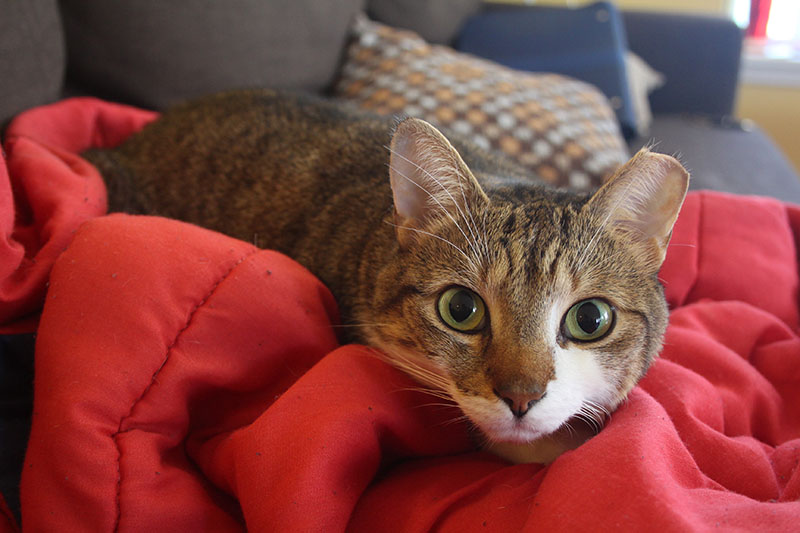Hey Pet Parents & Pet Lovers,
Have you ever eaten something and realized your kitty is mad curious about it? I know Walker, my mom’s cat, has no boundaries and will climb all over you to get at whatever you’re eating. On the other hand, my cat Beau is a bit more subtle and will watch you from afar and if he sees a piece of food drop onto the floor he’ll run in for the kill.
With summer being around the corner there are a bunch of fruits that are going to be back in season, one being watermelon! Watermelon is refreshing, sweet and is considered a healthy snack for folks on the go, but is watermelon safe for our cats?

SHORT ANSWER
Yes! Watermelon is considered safe to eat for cats, but it’s a good idea to only feed your cat watermelon in moderation.
BENEFITS OF EATING WATERMELON
WATER CONTENT
So you may already know that cats aren’t huge fans of sweet. Well if you didn’t, here’s a little funfact…cats can’t taste sweet at all!
So, what makes cats interested in watermelon? Funny enough, it’s the high water content. Watermelon has a water content of 91.45g/100g, making the majority of it… well… water! That being said, if you’ve been having trouble getting your cat to drink and you know your cat is a bit of a glutton ready to try new treats, watermelon might be the treat for you!
FIBRE
We talk about this a lot on our site, as fibre is a key part of a cat’s diet and some cat foods don’t actually have enough to support the average cat. Cats like this tend to become constipated regularly and while I commonly recommend giving your cat pumpkin to help move things, watermelon is also a great choice.
EXTRA VITAMINS
If your kitty is lacking certain vitamins, or if you’re a fan of pre and probiotics, watermelon could be a great addition into your cat’s nutrition as it is filled with Vitamin A & C.
Watermelon is also filled with magnesium and potassium, which are also part of a cat’s natural healthy diet.
Studies have also shown that watermelon can be beneficial for heart health and bone health because of the carotenoid lycopene found inside of it.

CONCERNS ABOUT CATS EATING WATERMELON
SEEDS
When feeding your kitty watermelon, just be very careful when it comes to seeds. Unfortunately, the seeds have compounds (like cyanide) in them that are dangerous to cats.
Always make sure to give your watermelon a quick rinse, even if the watermelon is considered “seedless.”
WHAT HAPPENS IF MY CAT EATS THE SEEDS?
Commonly a cat eating watermelon seeds leads to diarrhea and vomiting. In serious and severe cases where the cat has digested a number of seeds, it may lead to the need for a blood transfusion. This is due to the fact that cats are much smaller than humans making them more vulnerable to cyanide poisoning.
If you suspect that your cat has been poisoned by the seeds of watermelon make sure to contact your vet immediately. If they are not available contact an emergency vet in your area.
THE RIND
Although a watermelon rind doesn’t cause any major health risks, the rind might be too difficult for your cat to digest. Due to the fact that cats are obligate carnivores, they do not have the enzymes required to break down certain plant matter. That being said, it’s best to cut off a watermelon rind before eating it.
DIABETES
As with most fruit, you’re going to have to be careful how much watermelon you feed your furry friend.
Watermelons should never be fed to cats who already have diabetes. As is with all treats, a cat should always be monitored while they are trying new foods and should never be fed too much at a time.
HOW MUCH AND HOW OFTEN SHOULD I FEED MY CAT WATERMELON?
Watermelon should only be fed occasionally to a cat as a treat.
Vets always recommend a maximum of 10% of the cat’s regular diet for treats (watermelon included.)
I, personally, would also limit watermelon to “a treat when my cat is constipated” or, “we’re having a barbecue and we have some watermelon to treat our little ones with. While it does have great benefits, overfeeding does cause the potential risk of diabetes, which is so common in cats especially from the kibble & wet food they eat.
CONCLUSION
While watermelon might not be an “everyday” kind of treat, it sure can be a perfect “pick-me-up” when your cats need an extra hand with hydration or fibre.
As is with most foods, especially those with sugar, always make sure you’re feeding your cat watermelon in moderation. It’s always best to speak to your vet about whether or not watermelon is right for your cat, especially if they are suffering from conditions such as diabetes.
Always be monitoring your cat for any diarrhea or vomiting and make sure to call your vet if you ever suspect that your cat has eaten any seeds or is having an allergic reaction.
Other foods you might be curious if cats can or can’t eat:
Nuts/Legumes: Peanuts | Cashews | Pecans
Fruits/Vegetables: Olives | Watermelon | Bananas
Treats/Liquids: Ice Cream | Almond Milk | Coffee | Soy Milk
Misc. Plants: Roses